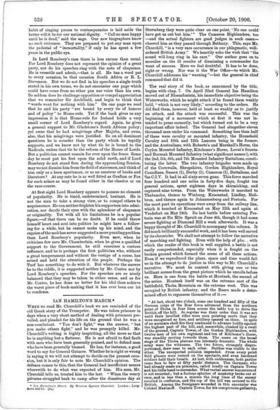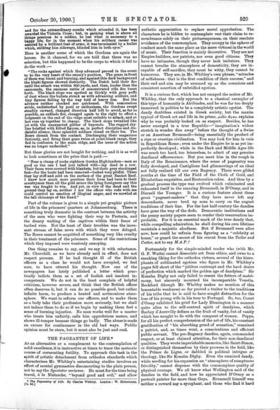IAN HAMILTON'S MARCH.*
WHEN we read Mr. Churchill's book we are reminded of the old Greek story of the Trumpeter. He was taken prisoner in days when a very short method of dealing with prisoners pre- vailed, and pleaded for his life on the ground that he was a non-combatant. "You don't fight," was the answer, "but you make others fight," and he was promptly killed. Mr. Churchill's writing is highly inspiriting, all the more so that he is anything but a flatterer. He is not afraid to find fault with men who have been generally praised, and to defend men who have been generally blamed. He has, for instance, a good word to say for General Gatacre. Whether he is right or wrong in saying it we will not attempt to decide on the present occa- sion, but it is only fair to note Mr. Churchill's opinion. The defence comes to this, that the General had insufficient means wherewith to do what was expected of him. His men, Mr. Churchill tells us, trusted him to the last. "When the weary privates struggled back to camp after the disastrous day at • /an ItaMilton's March. By Winston spencer Churchill. London : Long- mans and Co: [Si.)
Stormberg they were quite clear on one point, 'No one could •
have got us out but him.' " The Cameron Highlanders, too —and the actual fighters are good judges in such eases:—
cheered him as they passed through Bethany. This, says Mr, Churchill, "is a very rare occurrence in our phlegmatic, well-
ordered British Army." We heartily echo the wish that "the sound will long ring in his ears." Our author goes on to moralise on the ill results of dismissing a commander for want of success. Here we feel doubtful. It has to be done, right or wrong. Nor was it the War Office—to which Mr. Churchill addresses his "warning "—but the general in chief command that did it.
The real story of the book, as announced by the title, begins with chap. 7. On April 22nd General Ian Hamilton moved out of Bloemfontein, his immediate objective being the Waterworks, which he might attack if he found them weakly held, "which is not very likely," according to the orders. He did find them, however, held at least so weakly as to justify an attack, and the attack was successful. This was the beginning of a movement which at first it was not hi- tended to press earnestly, but which turned out to be a very important affair indeed. The General had altogether eleven thousand men under his command. Something less than half of these were cavalry or mounted infantry, the Household Cavalry and 10th and 12th Lancers being in the former, and the Australians, with Roberts's and Marshall's Horse, the Ceylon Mounted Infantry, Kitchener's Horse, Lovat's Scouts, and Burmah Mounted Infantry (what significant names!), with
the 2nd, 5th, 6th, and 7th Mounted Infantry Battalions, consti- tuting the latter. The two infantry brigades were made up of the Cornwalls, Shropshires, Gordon Highlanders, Royal Canadians, Sussex (1), Derby (1), Cameron (1), Battalions, and the C.I.V. It had in all sixty-seven guns. This force marched four hundred and one miles in forty-five days, fought ten general actions, spent eighteen days in skirmishing, and captured nine towns. From the Waterworks it marched to Thabanchu, thence to Winburg, Kroonstad, Lindley, Heil- bron, and thence again to Johannesburg and Pretoria. For the most part its operations were away from the railway line, which it touched at Kroonstad on May 12th and again at Vredefort on May 24th. Its last battle before entering Pre- toria was at Six Mile Spruit on June 4th, though it had some severe fighting at Diamond Hill a week afterwards. It was a happy thought of Mr. Churchill to accompany this column. It did much brilliantly successful work, and it has been well served by its chronicler. We shall not attempt to follow the narrative of marching and fighting. Even with the help of plai. , with which the reader of this book is well supplied, a battle is not easily comprehended, especially when it is fought on the broken ground which formed the scene of all these actions. Even if we reproduced the plans, space and time would fail us in the attempt to do justice in this way to Mr. Churchill's narrative. We must be content with giving one or two
brilliant scenes from the great picture which he unrolls before us. Here is one from the battle at Houtnek, the second of the series. Houtnek itself was on the extreme east of the battlefield, Thoba Mountain on the extreme west. This was occupied by British infantry, and the Boers made a deter- mined effort to repossess themselves of it :—
"At last, about two o'clock, some one hundred and fifty of -the German corps of the Boer force advanced from the northern point of Thoba in four lines across the table top to drive the British off the hill. So regular was their order that it was not until their levelled rifles were seen pointing south that they were recognised as foes, and artillery opened on them. ln spite of an accurate shell fire they continued to advance boldly against the highest part of the hill, and, meanwhile, cloaked by a swell of the ground, Captain Towse, of the Gordon Highlanders. with twelve men of his own regiment and ten of Kitchener's Horse, was steadily moving towards them. The scene on the broad stage of the Thoba plateau was intensely dramatic. The whole army were the witnesses. The two forces, strangely dispro• portioned, drew near to each other. Neither was visible to the other. The unexpected collision impended. From every point field glasses were turned on the spectacle, and even hardened soldiers held their breath. At last, with suddenness, both parties came face to face at fifty yards' distance. The Germans, who had already made six prisoners, called loudly on Captain Towse and his little band to surrender. What verbal answer was returned is not recorded ; but a furious splutter of musketry broke out at once, and in less than a minute the long lines of the enemy recoiled in confusion, and the top of the hill was secured to the British. Among the foreigners wounded in this encounter was Colonel Maximoff. Captain Towse. for his conspicuous gallantry,
and for the extraordinary results which attended it, has been awarded the Victoria Cross ; but, in gaining what is above all things precious to a soldier, he lost what is necessary to a happy life, for in the moment when his military career was assured by a brilliant feat of arms, it was terminated by a bullet which, striking him sideways, blinded him in both eyes.'
Here is another scene of which the Gordons are again the heroes. So it chanced, for we are told that there was no selection, but this happened to be the corps to which it fell to do the work :— "The rocks against which they advanced proved in the event to be the very heart of the enemy's position. The grass in front of them was burnt and burning, and against this dark background the khaki figures showed distinctly. The Dutch held their fire until the attack was within 800 yards, and then, louder than the cannonade, the ominous rattle of concentrated rifle fire burst forth. The black slope was spotted as thickly with grey puffs of dust where the bullets struck as with advancing soldiers, and tiny figures falling by the way told of heavy loss. But the advance neither checked nor quickened. With remorseless stride, undisturbed by peril or enthusiasm, the Gordons swept steadily onward, changed direction half left to avoid, as far as possible, an enfilade fire, changed again to the right to effect a lodgment on the end of the ridge most suitable to attack, and at last rose up together to charge. The black slope twinkled like jet with the unexpected glitter of bayonets. The rugged sky- line bristled with kilted figures, as, in perfect discipline and dis- dainful silence, those splendid soldiers closed on their foe. The Boers shrank from the contact. Discharging their magazines furiously, and firing their guns twice at point-blank range, they fled in confusion to the main ridge, and the issue of the action was no longer undecided."
But these glories are not bought for nothing, and it is as well to look sometimes at the price that is paid :— " Near a clump of rocks eighteen Gordon Highlanders—men as good as the one I had just talked with—lay dead in a row. Their faces were covered with blankets, but their grey stockinged feet—for the boots had been removed—looked very pitiful. • There they lay stiff and cold on the surface of the great Banket Beef. I knew how much more precious their lives had been to their countrymen than all the gold mines the lying foreigners say this war was fought to win. And yet, in view of the dead and the ground they lay on, neither I nor the officer who rode with me could control an emotion of illogical anger, and we scowled at the tall chimneys of the Rand."
Part of the volume is given to a simple yet graphic picture of life in the prisoners' quarters at Johannesburg. There is something truly dramatic in the contrast between the activity of the men who were fighting their way to Pretoria, and the dreary waiting of the captives within their fence of barbed wire. Not the least of their troubles was the inces- sant stream of false news with which they were deluged. The Boers cannot be acquitted of something very like cruelty in their treatment of the prisoners. Some of the restrictions which they imposed were wantonly annoying.
One thing remains to say, and we say it with reluctance. Mr. Churchill, as we have already said in effect, does not respect persons. If he had thought ill of the British officers as a class be would not have scrupled, we feel sure, to have uttered his thought. Now one of the newspapers has lately published a letter which prac- tically indicts them as a set of foolish and insolent in- competents. We do not in the least complain of helpful criticism, however severe, and think that the British officer often deserves it, but it can do no possible good, but rather infinite harm, to produce a heated and acrimonious atmo- sphere. We want to reform our officers, and to make them as a body take their profession more seriously, but we shall not induce them to do so if we begin by making them feel a sense of burning injustice. No man works well for a master who treats him unfairly, calls him opprobrious names, and shows ill-temper because things go badly. The abuse is made an excuse for continuance in the old bad ways. Public opinion must be stern, but it must also be just and cooL







































 Previous page
Previous page